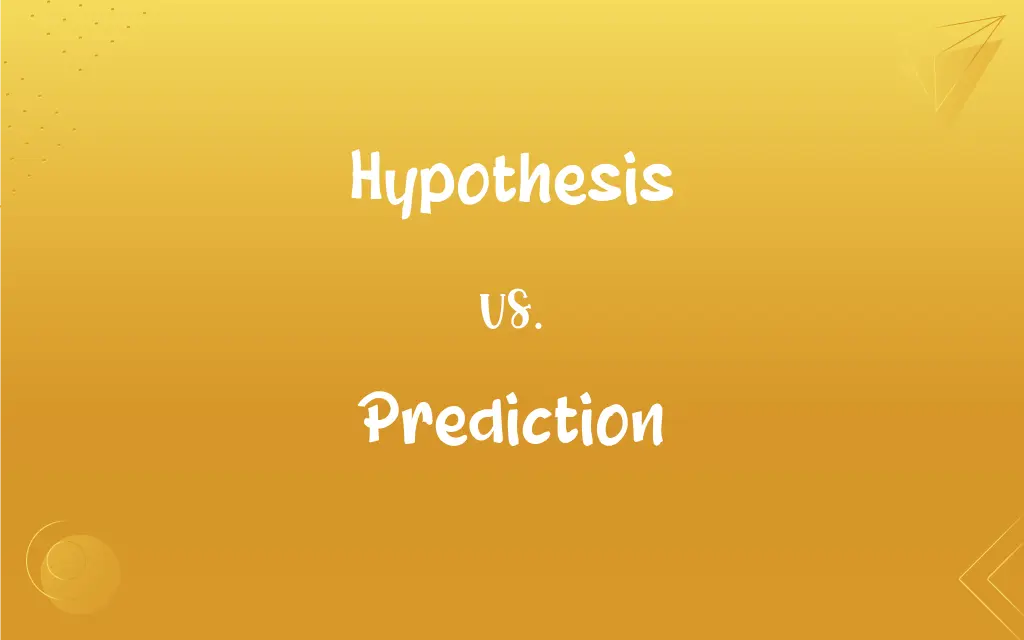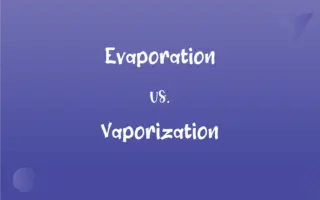Hypothesis vs. Prediction: What's the Difference?
Edited by Aimie Carlson || By Harlon Moss || Updated on October 18, 2023
A hypothesis is a testable explanation for a phenomenon, while a prediction is a forecast of what will happen under specific conditions based on a hypothesis.

Key Differences
A hypothesis serves as a proposed explanation for a phenomenon or set of observations. It forms the basis of research or experimentation. A prediction, meanwhile, is a specific statement forecasting a particular event or outcome based on the hypothesis.
A hypothesis is often formed after observing and analyzing a particular pattern or phenomenon. It is broader and can be general. A prediction is derived from a hypothesis and describes a specific outcome expected in a particular situation.
While both hypothesis and prediction are subject to testing, the hypothesis is what is fundamentally being tested in experiments or research. Predictions are used to verify if the hypothesis holds true under the set conditions.
If a prediction proves incorrect, it may suggest the hypothesis is flawed or incomplete. On the other hand, consistently accurate predictions can strengthen confidence in the hypothesis.
In scientific research, a hypothesis sets the stage for an experiment or study, providing a theoretical framework. Predictions are concrete statements made before the experiment is conducted, giving clarity on what to expect if the hypothesis is correct.
ADVERTISEMENT
Comparison Chart
Definition
Proposed explanation for a phenomenon.
Forecast of an outcome based on a hypothesis.
Basis
Observations and prior knowledge.
Derived from the hypothesis.
Scope
General and broad.
Specific and narrow.
Testability
Forms the foundation of tests.
Used to confirm the hypothesis by verifying outcomes.
Impact of Incorrectness
Leads to re-evaluation or modification.
Can cast doubt on the validity of the hypothesis.
ADVERTISEMENT
Hypothesis and Prediction Definitions
Hypothesis
An educated guess in science that can be tested.
The scientist's hypothesis was that the chemical would change color under intense heat.
Prediction
A statement foretelling a future event.
The meteorologist's prediction was of rain tomorrow.
Hypothesis
A tentative explanation for an observation.
Based on the strange behavior of the birds, my hypothesis is that there's a change in the weather.
Prediction
A forecast based on evidence or trends.
Her prediction about fashion trends always seemed to be accurate.
Hypothesis
A proposition made as a starting point for further investigation.
Her hypothesis regarding the historical site led to a new archaeological dig.
Prediction
An educated guess about an outcome.
Based on the data, his prediction was that sales would increase by 10% next quarter.
Hypothesis
An assumption used to draw conclusions.
Based on the hypothesis that demand would rise, the company increased production.
Prediction
A specific result expected from a hypothesis.
The scientist's prediction was that the mice would navigate the maze faster after the treatment.
Hypothesis
An underlying explanation that leads to predictions.
The researcher's hypothesis about sleep patterns offered fresh insights into insomnia.
Prediction
An outcome anticipated from a set of conditions.
The model gave a prediction of higher temperatures due to global warming.
Hypothesis
A tentative explanation for an observation, phenomenon, or scientific problem that can be tested by further investigation.
Prediction
The act of predicting.
Hypothesis
Something taken to be true for the purpose of argument or investigation; an assumption.
Prediction
Something foretold or predicted; a prophecy.
FAQs
What happens if a prediction is wrong?
A wrong prediction may suggest a flaw in the hypothesis or the conditions of the test.
What is the primary purpose of a hypothesis?
A hypothesis offers a testable explanation for a specific phenomenon or set of observations.
Can one hypothesis lead to multiple predictions?
Yes, a single hypothesis can result in several predictions depending on the conditions.
Are hypotheses limited to scientific research?
No, while commonly used in science, hypotheses can be found in various fields of study.
Can predictions be made without a hypothesis?
Yes, predictions can be based on trends or intuition, but in scientific contexts, they often stem from hypotheses.
How is a prediction related to a hypothesis?
A prediction is a specific outcome expected based on the hypothesis.
Can a hypothesis be proven?
A hypothesis can be supported or refuted, but not absolutely proven.
What makes a good hypothesis?
A good hypothesis is clear, testable, based on existing knowledge, and falsifiable.
How is a hypothesis different from a theory?
A hypothesis is a testable proposition, while a theory is a well-substantiated explanation based on extensive evidence.
What should one do if the hypothesis is not supported by evidence?
One should revisit, modify, or discard the hypothesis based on the evidence.
How are predictions useful in experiments?
Predictions offer specific expected outcomes, helping in designing experiments and gauging results.
Can a hypothesis change over time?
Yes, a hypothesis can evolve based on new observations and evidence.
Why is it essential for a prediction to be specific?
Specificity in predictions allows for clear testing and validation of the hypothesis.
Are predictions always about the future?
Mostly, but predictions can also forecast outcomes of situations from the past that haven't been observed.
Can multiple predictions validate a single hypothesis?
Yes, consistent outcomes across multiple predictions can strengthen confidence in a hypothesis.
Is a hypothesis always correct?
No, hypotheses are tentative explanations and can be refuted by evidence.
Are all predictions accurate?
No, predictions can be incorrect, which can lead to revisiting the underlying hypothesis.
What role do hypotheses and predictions play in the scientific method?
They are integral, with the hypothesis providing a theoretical base and predictions guiding experimental outcomes.
Can a hypothesis be a question?
No, a hypothesis is a statement, but it often originates from a research question.
Can predictions be qualitative?
Yes, predictions can be both qualitative and quantitative.
About Author
Written by
Harlon MossHarlon is a seasoned quality moderator and accomplished content writer for Difference Wiki. An alumnus of the prestigious University of California, he earned his degree in Computer Science. Leveraging his academic background, Harlon brings a meticulous and informed perspective to his work, ensuring content accuracy and excellence.
Edited by
Aimie CarlsonAimie Carlson, holding a master's degree in English literature, is a fervent English language enthusiast. She lends her writing talents to Difference Wiki, a prominent website that specializes in comparisons, offering readers insightful analyses that both captivate and inform.































































